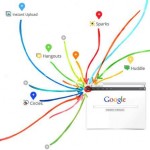 Sharing’ seems to be the new mantra for Google. Apart from the recent launch of Google+ which has ‘sharing’ as its theme, Google is now in the process of developing a data-exchange product, which will enable the sharing of consumer data.
Sharing’ seems to be the new mantra for Google. Apart from the recent launch of Google+ which has ‘sharing’ as its theme, Google is now in the process of developing a data-exchange product, which will enable the sharing of consumer data.
This attempt is expected to take online advertising to a new level by improvising upon the root of digital advertising – buying and selling data.
Cnet posted, “Data exchanges are not new. The services allow Web site owners to sell data on their users to potential advertisers. So, rather than buying a single banner ad at the top of the page for all to see, data exchanges allow advertisers to target specific portions of the site’s audience, such as stay-at-home parents living in Montana or people shopping for a new smartphone.”
Citing “executives” with knowledge of Google’s plans, AdAge says that the search giant is calling its data exchange “DDP” in-house.
According to AdAge, Google’s plans revolve around Web publishers currently using DoubleClick. Those folks “would be able to sell data on their audiences in the exchange as easily as they might sell ad space.”
Speaking to AdAge Google’s display advertising vice president, Neal Mohan, said that data, in addition to traditional advertising inventory, should play a role in the company’s future.
“If our vision is a comprehensive one, it needs to contemplate data in addition to ad inventory,” Mohan told AdAge. “We are working on initiatives to help publishers and advertisers do just that.”
According to Google executives, this project is probably its most ambitious move in becoming the largest name in brand advertising.
Google dominates search advertising, but since it has limited properties on which to sell online display, it has focused on assembling the infrastructure that powers display advertising. Its assets now include DoubleClick, Invite Media, Teracent, Google’s ad exchange and the newly acquired AdMeld, pending a review by the Department of Justice.
Mr. Mohan cautioned that such a move into data services may not result in one product, but capabilities across Google’s online display infrastructure, such as Invite Media, which allows advertisers to bid on audience, or AdMeld, which helps publishers to decide which ad will yield the greatest revenue.
One debate internally has been over whether to charge a percentage to use the service, as it does with Invite Media (which charges advertisers for services) and DoubleClick (which charges publishers), or make it free to use so Google would reap the benefits of more effective ad campaigns, and presumably, more spending.
There are currently a few companies operating data exchanges right now. One of the more prominent companies in that space, BlueKai, claims to allow advertisers to target 300 million users around the globe through its service. BlueKai collects data from Web publishers on topics ranging from NFL tickets to cable TV accessories. According to the company, Nielsen is one of several firms that offers its data through the service.
On its site, BlueKai is quick to point out that the data it collects is entirely “anonymous”–a feature that must play a role in Google’s own data exchange, considering the scrutiny it has faced over privacy and online advertising.
 Because so many publishers use Google’s technology, as do agency groups such as Publicis and Omnicom, Google’s exchange could aggregate data on an unprecedented scale, allowing the creation of very detailed profiles of consumers, as well as the matching of online and offline data.
Because so many publishers use Google’s technology, as do agency groups such as Publicis and Omnicom, Google’s exchange could aggregate data on an unprecedented scale, allowing the creation of very detailed profiles of consumers, as well as the matching of online and offline data.
Right now, Google, Facebook, Yahoo, Microsoft and others hold vast amounts of consumer web-surfing data, and advertisers buy online and offline data from companies such as Targus Info, Claritas and Catalina Marketing. “There is huge fragmentation in how data is accessed and how it is used. Google is in a different position to fundamentally change the landscape,” said Adam Lehman, chief operating officer of data provider Lotame.
Some publishers and certainly agencies will no doubt see the exchange as a threat. WPP, for example, recently set up a new business unit Xaxis to collect and store proprietary data from its clients to better target ads.
“Those companies with the largest store of proprietary data will have an advantage,” said Xaxis CEO Brian Lesser. “I think right now people are in the early stages of figuring it out.”
Google is yet to announce the particulars and an exact date for the data-exchange to roll out.


